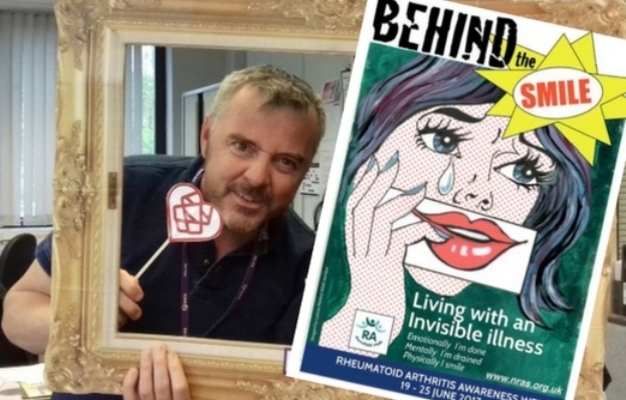Living with 'invisible' illness

RA Awareness Week (19th - 25th June) is organised by the National Rheumatoid Arthritis Society (NRAS). This year's theme is the hidden nature of some disabilities, and how people often don't realise what's going on 'Behind the Smile'.
Here, LionHeart communications officer Glenn Gallocker shares his experience of living with the condition

If you say 'arthritis' most people assume you're talking about wear and tear on the joints, which many older people have. That's osteoarthritis.
Rheumatoid arthritis, or RA, is different. It is a type of disease known as an autoimmune condition. This means that your body's immune system has made a mistake and picked a wrong target.
To explain: your immune system is designed to defend your body against infection. It should not attack your body. Sometimes, though, the immune system becomes too active, and mistakenly attacks your body, and this is called an 'autoimmune' disease.
When you have RA, your immune system attacks the lining of your joints (the synovial lining). This causes inflammation, which leads to symptoms such as pain and stiffness. Major fatigue beyond normal tiredness is also a symptom.
I can't remember why I went to my GP in 2008, but it transpired that I was 'borderline' suffering from rheumatoid arthritis. I didn't think much of it at the time as I felt healthy, if not particularly fit.
I thought it was age-related arthritis and was just a bit miffed to contract it at 44. I didn't take it seriously at all; after all, I felt absolutely fine and what's more, I hadn't been prescribed any medication which in my book was a winner.
It wasn't until around 2012 when I began to feel a few aches and pains in my fingers and ankles so I returned to my GP who referred me to an RA consultant at my local hospital. I was told that it was very serious and that there is no cure available.
The consultant reassured me that we had caught it early and that there were very good treatments to 'slow its progress'. On my first appointment I received hydrocortisone injections in my hands and left feeling hopeful.
A month later I bounced into his surgery once more, smiling and bleating on about the 'miracle cure' I had received into my hands via his needles. This celebration was short-lived - as the weeks and months went by, I began to suffer more and more pain.
I tried not to feel sorry for myself as I had discovered that friends of mine also had the condition and were further down the path of deterioration than I was.
Five years on from there, I'm now still feeling lucky that I don't need the use of a mobility scooter just yet, but it definitely affects my day to day life. I am in constant pain every day, but I avoid too many painkillers because I struggle to function at work when I take them. Anyway, I take enough pills every day!
Walking has become much harder and I have discovered that if I over-exert myself on any given day, I am crippled with pain the following day and I am exhausted much of the time which has a bearing on my ability to concentrate.
I no longer feel that RA is my 'invisible illness' due to the varying degrees of limping which anyone can clearly see. My general fitness, although somewhat lacking before, is now at an all time low.
At last, I am now taking responsibility for my health and diligently take my medication every day and go for my regular blood tests and RA clinic appointments. Too painful to attend the gym these days, I've recently been thinking about swimming to help with my lack of fitness.
- LionHeart can help if you are living with serious illness or disability which is negatively impacting your life. Call one of the support officers on 0845 6039057.

